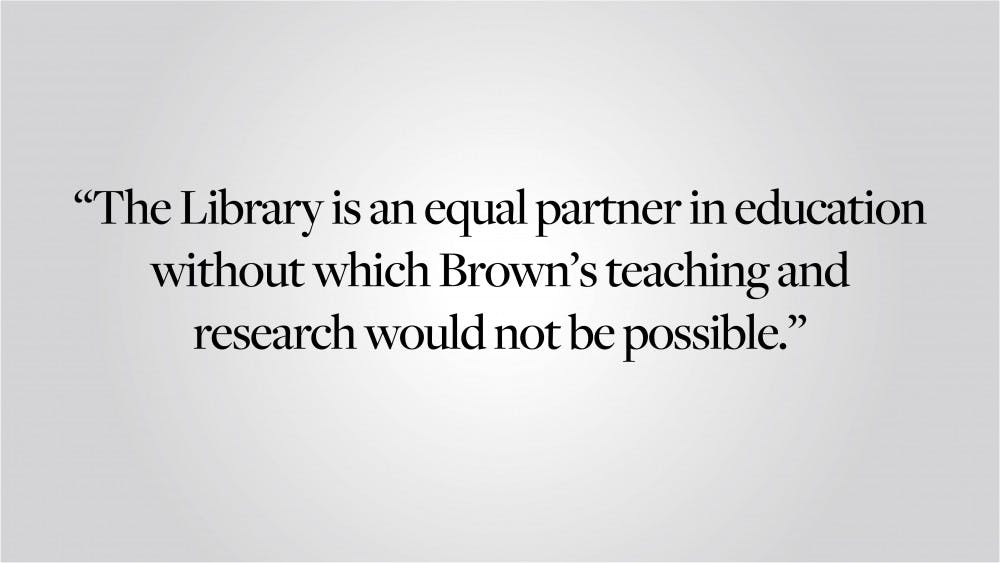It has now been over a year of living in the COVID-19 pandemic and learning largely in a virtual environment. Yet, academic functions at Brown must continue. One of the unsung heroes involved in some shape or form in all our academic journeys is the Brown University Library. We owe a great deal of gratitude to the Library, particularly for the services it has managed to continue providing despite the challenges of operating in a virtual environment. But even without the context of a global pandemic, the Library is truly one of Brown’s marvels.
The Brown University Library is composed of the John D. Rockefeller, Jr. Library, John Hay Library, Sciences Library, Orwig Music Library, Annmary Brown Memorial and the Library Collections Annex. When we think of Brown, our educational journeys and our fields of study, the University’s academic units (departments, schools, institutes, centers, programs, etc.) often come to mind first. Yet, the Library is an equal partner in education without which Brown’s teaching and research would not be possible.
Subject librarians help students, faculty and other researchers in their projects and classes. During my time at Brown, I have personally had consultations with eight different subject librarians to discuss all sorts of issues: exploring research topics, finding a starting point for a niche topic in Native American studies, evaluating publishers, conducting biographical research and using technology to support and optimize the research process. As a concentrator in both French and Francophone Studies and Latin American and Caribbean Studies, I have received assistance in finding and evaluating materials in French and Spanish. The Library also offers plenty of workshops open to Brown students. One of my best time investments was attending a workshop in fall 2018 on Zotero, a powerful, free-to-use citation and reference management tool; it has saved me countless hours in writing citations and bibliographies over the past few years.
The actual process of getting materials can also be a challenge in and of itself, but the Library has specialized teams to tackle this. For example, the Interlibrary Loan office has helped track down unusual materials that I have requested, which are delivered to College Hill from across the country and the world; I have received materials from states like New York, Kansas and California, and from as far as Switzerland and Denmark, all at no cost to me. When I was studying abroad in Paris and needed materials for a research assignment that weren’t available at Sorbonne Université, what did I do? I found relevant materials that were available through the Library’s Annex and requested that they be scanned and emailed to me.
Nothing is perfect, and the Library is no exception. Books that I had requested have been inadvertently sent to my sister (also a Brown student), the online catalog is frequently glitchy and I once went on a scavenger hunt in the Rock stacks to find two improperly catalogued books that, according to the curator at the Hay, should have been in Special Collections. I was also dismayed that, pre-pandemic, undergraduate students could not request staff to pull or hold non-Annex materials, while faculty and graduate students have this privilege; it is as if undergraduates’ time is less important. But everyone at the Library has been working hard, especially during the COVID-19 pandemic. In particular, the Access Services and Resource Sharing teams were recently recognized jointly by Brown University Human Resources with this year’s Excellence Award for Innovation at Brown Employee Appreciation and Recognition Day for their adaptability in continuing to support the Brown academic community during the COVID-19 pandemic.
Even after I have graduated from Brown, I will have reason to come back to the Library. The President’s Papers of the University’s presidents are restricted for 25 years, but you can bet that I will be back to see the papers of Brown’s most recent presidents. I would be particularly interested in the papers from the presidency of Sheila E. Blumstein, the first female president of Brown University, who stepped into the role after the unexpected departure of the controversial E. Gordon Gee. A slight, but entertaining aside: The Harris Collection of American Poetry and Plays, housed in the Hay, has an anonymously written satirical poem about Gee. Without doubt, I know that I will be applying for my Brown Alumni Library Card once I graduate, which, for the one-time fee of $15, will give me lifetime access to the marvelous treasure that is the Brown University Library.
Poom Andrew Pipatjarasgit ’21 can be reached at poom_pipatjarasgit@brown.edu. Please send responses to this opinion to letters@browndailyherald.com and op-eds to opinions@browndailyherald.com.

ADVERTISEMENT




